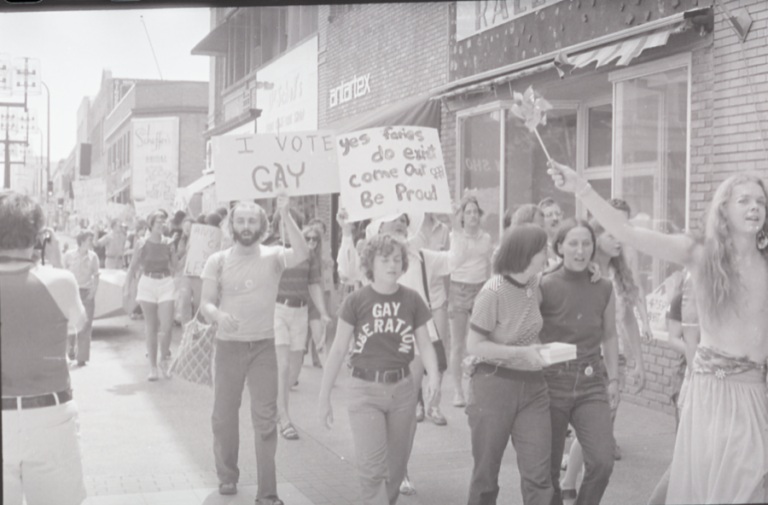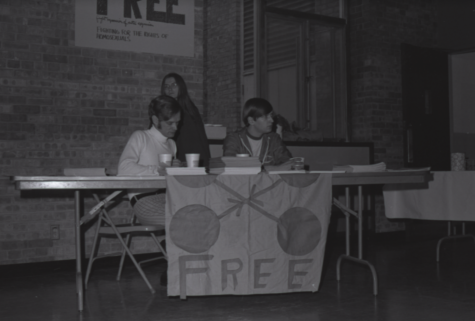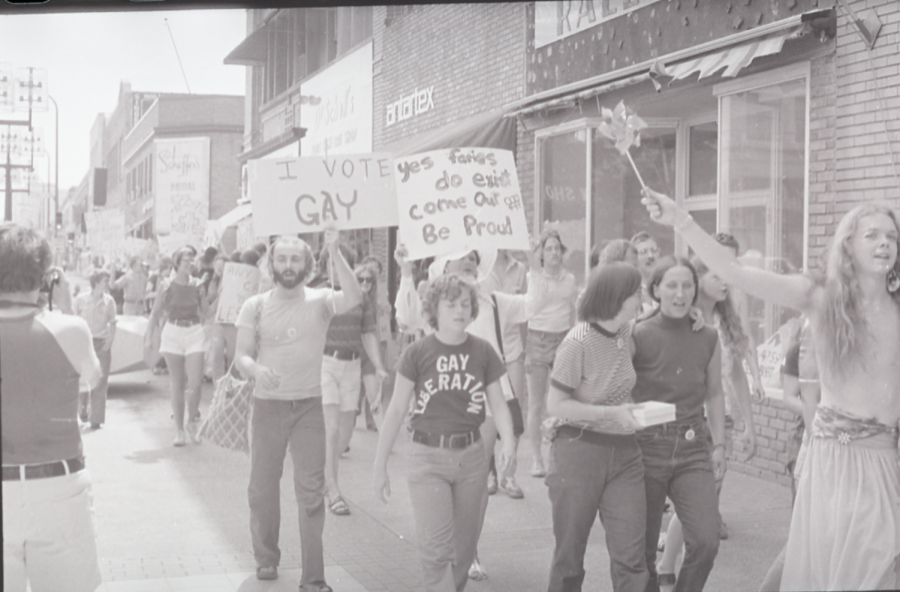
What started as a class turned into an LGBTQ+ rights movement.
FREE members participating in one of their many pickets. Founder Koreen Phelps can be seen in a dark sleeveless turtleneck to the right. Photo courtesy of the Jean-Nickolaus Tretter GLBT Collection.
A month before the Stonewall riots in New York City, “The Homosexual* Revolution” started in Minneapolis.
It began as an informal class, titled the “Homosexual Revolution,” at a coffee shop in May of 1969. Koreen Phelps and Stephen Irhig talked about “homosexuals’” role in the sexual revolution and used the class to connect with gay people in their community.
“Because of their vulnerability, Irhig and Miss Phelps have asked other homosexuals to band together,” the Minnesota Daily reported on June 6, 1969. “If someone loses his job because an employer finds out his sex preferences, the group will picket the business. If somebody is arrested for his activities, we will protest.”
It quickly transformed from a class to an official University of Minnesota student group in the fall of 1969, titled FREE (Fight Repression of Erotic Expression).
“This group that they created was created out of love and compassion,” said Noah Barth, public historian and creator of the documentary “FREE You: Minnesota’s Fight for Gay Liberation.”
FREE was short-lived, as it disbanded by the mid-1970s, but it was deeply influential, according to Barth. Barth said the group sparked the LGBTQ+ rights movement in Minneapolis.
“[FREE] was part of a larger movement for LGBTQ that emerged,” said Rachel Mattson, curator of the Tretter Collection for GLBT Studies.

The fight around employment discrimination
In 1970, Michael McConnell and FREE president Jack Baker publicly applied for a marriage license in Hennepin County, but were denied. Before attempting to get married, McConnell had been offered a job at the St. Paul campus, but after the Board of Regents found out that McConnell was gay, they took the job offer back.
FREE wanted to do more than protest hiring discrimination 一 the group aimed to create change within the University, as well. In 1970, they sent out letters to several large corporations asking if they’d hire a “homosexual” person. Honeywell said they would not knowingly hire someone who was gay.
FREE then began lobbying the University to bar not only Honeywell from recruiting students, but any organization that discriminated against “homosexual” people. In 1971, the University announced that they would bar companies from recruiting on campus if they would deny a student a job based on factors other than their academics.
Twenty years later, Minnesota became the first state to outlaw discrimination based on gender or sexuality in 1993.
“FREE has this lineage of very tangible activism that catapults the state into its LGBTQ progressivism,” Barth said.
FREE’s impact on today
Despite decades of activism, LGBTQ people still face many barriers.
“I don’t think [FREE’s goal] has been accomplished,” Mattson said.
There’s more work to be done, but Minneapolis has come far since 1969. There’s a well-known Pride festival, many LGBTQ people feel safe to publicly express affection toward their partners throughout various parts of the city and younger people are more comfortable with gender-neutral pronouns.
What began as two gay friends searching for a community developed into a group that would influence LGBTQ activists for years to come.
“The difference between a gay person and a hip gay person is self-acceptance. A hip person is not ashamed of what he is nor does he see himself as sick,” FREE founder Ihrig told the Minnesota Daily in 1969.
*The Minnesota Daily has chosen to use the word “homosexual” in some places throughout this article to authentically represent how the original activists in FREE described themselves.
Author’s note: FREE has a lively history and this article barely scratched the surface. If you want to learn more, check out Noah Barth’s documentary, Bruce Johansen’s article, or contact Rachel Mattson and visit the Jean-Nickolaus Tretter GLBT Archives.
